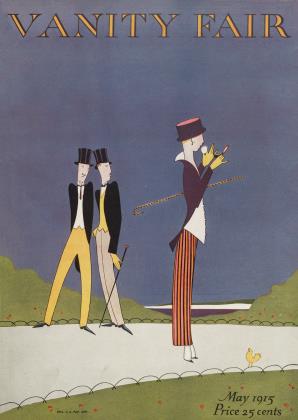Sign In to Your Account
Subscribers have complete access to the archive.
Sign In Not a Subscriber?Join NowTHE SINS ON GORDON CRAIG'S HEAD
THE most conspicuous of the originators of the growing school of Scenic Theatrical Producers is Gordon Craig, son of Ellen Terry. The increasing vogue of this type of scenic production—that is to say, a production the chief purpose of which is to make a startling ocular appeal—must rest upon his head, and this not because of the number or effectiveness of his productions, but because of the manner in which he has been kept before the public by his admiring followers and disciples. It was because of him that we had Stanislowski in Moscow, Max Reinhardt in Vienna, Bakst in Paris, Urban in Boston, and—though the artistic descent in this case is more remote —Granville Barker in New York.
So much attention is now being paid to the non essentials of the stage—the scenery, costumes, and lights—that the real essentials, which always have been and always will be, drama and acting— have been almost completely lost sight of. The poor drama, indeed, may be likened to a beautiful woman who has starved her body and dwarfed her soul in order to deck herself with silks and jewels.
In fact the word "Producer" has come to mean anybody who can devise new methods of lighting a stage, designing a costume, or painting a scene. Among the Think-They-Thinks the simple notion that a scene on the stage should be designed with the sole idea of aiding the dramatist, and the actors, in their efforts to play the piece adequately, and to create real foot-light illusion, is derided and laughed to scorn.
Too often the new type of scenic producer accentuates the externals of the drama, merely to conceal his ignorance of its inner and more secret mysteries.
In my opinion the supreme test of a great Producer is his ability to discover and bring forward native playwrights of high promise, and native actors of real ability. And, having done these two things, to bring them together, harmonize them, instruct and advise them; show them, in brief, how to serve the drama loyally and with the utmost fidelity. And, finally, to build up scenes and develop character, not by scenery, or lights, or costumes, but by action.
In short, a great Producer's knowledge must soar above the material side of the stage. He must know how to give the fullest dramatic value to the playwright's story, and how to make every actor appear at his best.
Let us not forget that Eleanora Duse captured New York in a single night—and with paper scenery.
James L. Ford
 View Full Issue
View Full Issue












Subscribers have complete access to the archive.
Sign In Not a Subscriber?Join Now